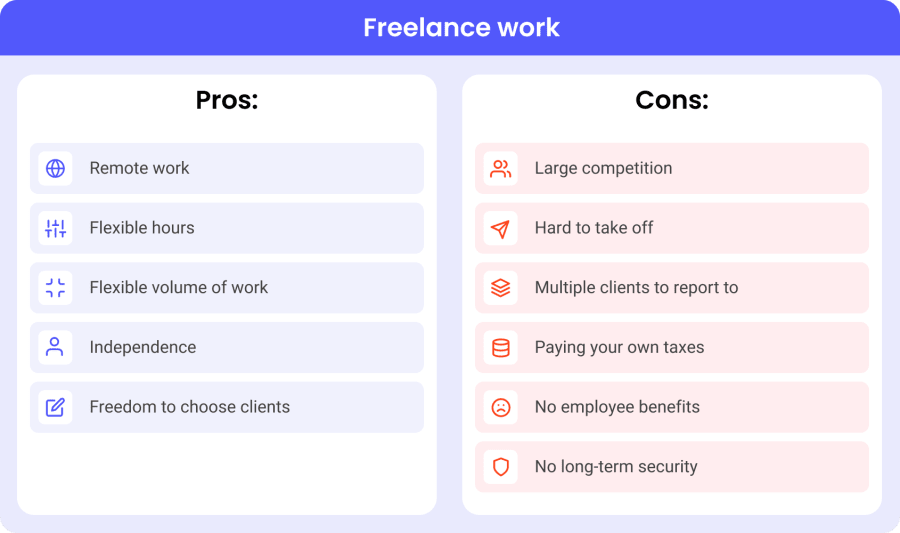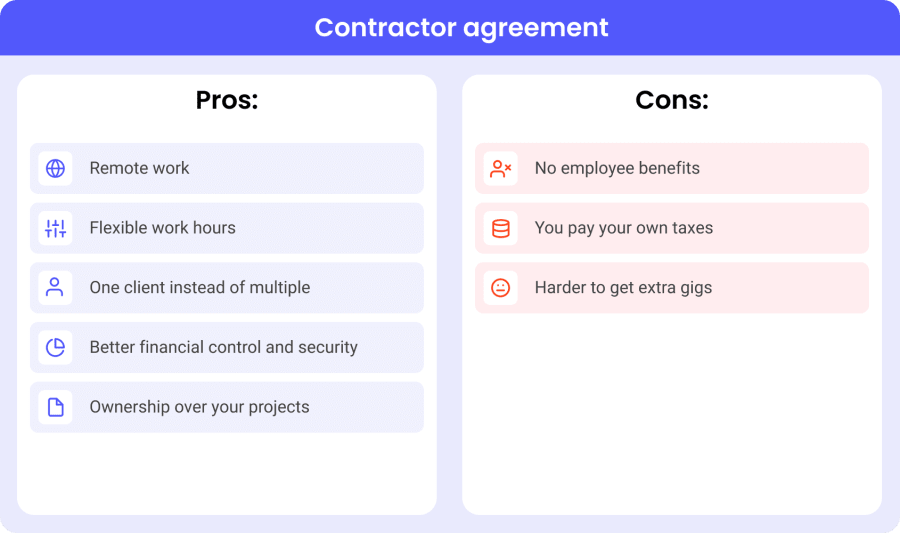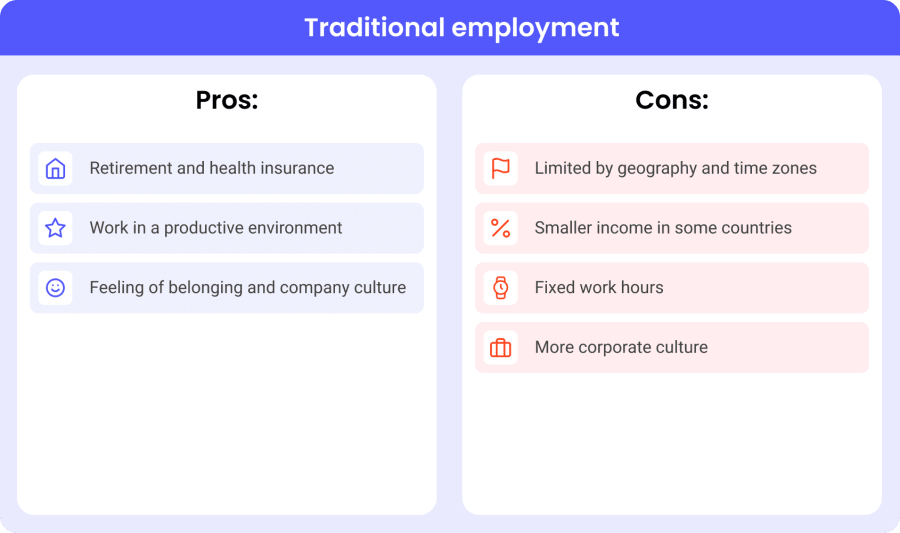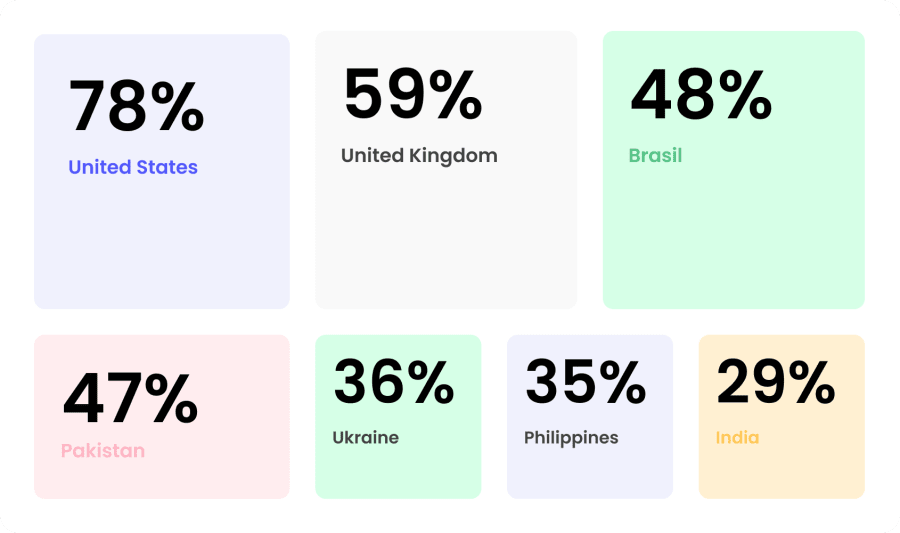Working in development these days is a ticket that opens many gates for professionals working in many specific fields and phases of their careers. It makes it possible to bridge language, time zones and geographical distances, and give opportunities to people that don’t fit the traditional employment mold either.
With the ability to work remotely, in a flexible environment and work hours—as well as to choose your own volume of work—you can definitely be more involved in growing your portfolio and be at the steering wheel of your own career.
Yet, freelancing, as good as it sounds, brings its own challenges. In this article, we’ll deep-dive into the pros and cons of being a freelancer, contractor or employee under a traditional contract.
Freelance work explained
In this type of work, a developer usually works with multiple clients at a time, and is paid per project. Instead of collaborating with the business owners, let’s say, they instead act as their own employers, while the business owners (or individuals) they collaborate with are now considered their clients.
The worker generally charges by either an hourly rate or per project, and decides their own fee based on experience, tech stack, previous recommendations and whether it is a short-term gig or a long term project that will take more involvement on their part. For example, instead of working for a development company operating on a B2B model, you offer your services for a single project.
They do their own taxes, invoicing and other legal matters, as well as take care of marketing and branding themselves as trustworthy experts in their field.
They are usually collaborating with multiple clients and nurture their profiles on freelancing platforms (which can be time-consuming). However, it truly enables them to work as much as they want, for the rates that they deem to be fair for their abilities.

The pros
This type of work had many positive aspects to it. If it weren’t true, why would an estimated 1.2 billion people work freelance?
Approximately one-third of the global workforce chooses to work on freelancing platforms, mostly because it allows them to earn more and take more charge over the work hours and workload.
The vast majority of people that worked independently also said that they would consider freelancing on some level in the future, even if it’s only for extra income and part-time gigs.
And in industries such as software, marketing, design and product management, it’s not like freelancing is done by workers with a lower level of education or skill. According to Upwork’s report, in the past year, 51% of post-grad workers were working independently. The share of high school graduates or people with lesser level of education that were freelancing has declined from 37% in 2020 to 31% this year.
Here are the main reasons why it is good to work independently.
Remote working
As obvious as this reason might sound, it is a very important one. This type of work enables people to work remotely, thereby opening up other countries, markets and opportunities to them.
I am typing up this article in Skopje, North Macedonia, in English, while working for a Swedish company. Fifteen years ago, this probably sounded like a fever dream. Yet, nowadays it is a reality that is highly achievable.
The benefits of remote working are much more than just being able to control your own environment and work hours. It means that with the required skill set, you can earn much, much more than what you would in your local market. Freelancers from countries with a lower average income can make a much better income by working remotely for foreign clients.
After the pandemic, the demand for this workforce skyrocketed. Unfortunately, a lot of companies terminated the traditional employment for their employees—instead relying on freelancers to cut on the employment tax, office costs, rent, etc. This worked in favor of freelancers, who can now charge even bigger rates while working from the comfort of their home, safe from any virus or other risk.
Flexible work hours
Freelance tech experts are also in the position to pick their own work hours. Instead of doing the traditional 9-to-5 work, they can pick at which time they are most productive, or when their clients are most responsive to ensure good and timely communication.
Still, being the boss of your own work hours doesn’t mean that you can work whenever you feel like it. They also have deadlines, and since they often charge by the hour, it is expected that they don’t drag the work on purpose just so they can make more money.
Some clients choose to track the work hours of the workforce too. Platforms like Fiverr and Upwork have features that allow clients to look into the progress of their hired freelancers.
Flexible volume of work
One of the greatest perks of freelancing is that you have a better chance of creating your own work/life balance. Freelancers can choose which projects they want to accept, and control the amount of time they spend working.
This has its risks too, though: sometimes it is hard to stop and say no. The lack of structure and boundaries sometimes makes it hard to give yourself enough time and appropriate amount of work. But, with proper planning and respect for your wellbeing, you can assure that you work as much as you are able to, for the wage you objectively deserve.
Independence and creativity
Without having a grand company-wide plan to stick to and no executive decisions on your projects, you are way more independent and able to express your creativity in engagements. Not having to conform to a pre-existing structure (that might not be exactly how you organize things yourself), gives you more freedom in doing your day-to-day tasks.
Freedom to pick clients
As an freelancer, you have more control over who you work with. This allows you to align yourself with employers that share your values, views and creative style. Or, simply, choose who pays you enough.
The cons
It would be wrong to just glorify freelance i.e., freelancing work, as it comes with its own hardships. Not only is the line between work and rest quite blurry, but you are also in charge of every logistic aspect of employment. And the global market is a much bigger arena in which you need to shine.
Large competition
A lot of veteran freelancers were following this model early on, on platforms like Odesk and Elance, which has merged into today’s gargantuan freelance platform that is Upwork. Fiverr, Guru, People Per Hour and others also boast with thousands of professionals in many different fields.
And if you join now, trying to get a reputable resume and a noticeable profile will be harder, especially without any reviews from clients.
Of course, it isn’t impossible. It is just time-consuming and hard, and you need to be aware that, in the beginning, you are probably going to have to undersell a bit. There is a large offer of freelancers that offer lower rates, so that is where you will start out as a beginner (unless you are extremely experienced and are only now starting up as a freelancer).
Hard to start at first
If you are stuck in a 9-to-5, office mindset, having your hands untied to plan your own work life will sound very exciting. But, it will also come with its own challenges.
It is very easy to get carried away and procrastinate or work from noon to late at night because no one is pressuring you to be up at 8 AM.
You can still plan your time well and try to stick to a routine to become your most productive self.
Hard to juggle multiple clients at a time
Working on multiple projects for multiple clients at the same time isn’t a problem per se. However, keep in mind that you need to communicate with these clients, discuss the project, report to them and often do reviews of what you’ve done so far.
Instead of reporting to one employer, you would have to do that with all of your clients.
Lack of long-term security
Working independently means no rolling contract, and no 100% guarantee that the next month you’ll get an equivalent of a full wage again.
It is up to you to get clients and fulfill your financial goals. Of course, there is a lot of demand, so in theory, this shouldn’t be a problem. But a full salary isn’t guaranteed in the way that it is with traditional employment.
You pay your own taxes
If you hate administration and bureaucracy as much as I do, this might be a huge reason why you don’t want to work independently.
Doing your own accounting and taxes, and reporting them to the government can be complicated. Especially if you work on a lot of smaller projects.
No employee benefits
Working like this also means that you pay (or don’t) for your own healthcare, retirement fund and dental. Plus, you don’t have a 20-something paid leave, sick leave or injury at work insurance. All of that comes from your own pocket.
Should you consider it?
If you are at a place in your career where you are certain that your skills could attract clients, and you are confident that you can manage multiple tasks from different clients, then absolutely!
It will give you a sense of pride in your job, complete and untampered freedom to choose who you work with, and most importantly—open the doors to a massive international market.
What is a contractor agreement?
Essentially, a contractor works as the freelancer, but only with one constant client. They are working on pre-defined work hours, projects and companies, but do not enjoy the perks of traditional employment such as health and retirement benefits. So why even do it, you might ask?
Well, because of remote work and better pay!
Here’s the rundown.

The pros
For contractors, the main perks of using this employment model are the bigger salaries. In fact, working with foreign companies that can pay much more than companies that compete on local markets is simply great. Finally, contractors can enjoy the notion of someone else giving you tasks and only reporting to a single team.
Here are the pros explained.
Remote working
Quite obviously, contractors often work for foreign companies. Very often, they come from lower-income countries (such as myself!) and are able to build an international portfolio while working for one client at a time.
It is a hassle-free version of independent, a.k.a., freelancing, especially if you prefer not chasing after clients and reporting to multiple people at the same time.
Flexible work hours
Personally, I am a fan of a fixed time schedule. I’m with the boomers on this one: routine helps me bring structure to my life, and I feel way more productive that way.
But, sometimes things happen that are out of your control. You might need to visit the dentist, go to a teacher-parents meeting or simply sleep in after a long day’s work.
When it comes to this, most companies that operate with remote teams aren’t as inflexible as traditional in-office jobs. You just have to give your coworkers a heads up, make sure there are no meetings while you are away and still deliver your projects on time.
One client instead of multiple
Again, this is a very individualistic opinion, but for many people, being able to only have a rapport with just one team instead of multiple, and having full knowledge of the system, productivity pace and preferences of one client is a big perk.
Better financial control and security
Working as a contractor also brings a more secure financial gain: you get the same salary each month, and you are sure that as long as you have the job—you don’t have to juggle between multiple gigs on an independent basis.
And if you think that you could make more money independently, that also might be true, but only for working longer hours.
The cons
It’s not all roses for the contractors either. Here are some of the more prominent negative aspects of working as a contractor. No employee benefits
Same as with freelancing work, no employee benefits come with working as a contractor. However, often the salary is solid enough for you to pay your own benefits if you want to.
You pay your own taxes
Working as a contractor also means you are in charge of your own taxes and accounting. Luckily, there are a lot of affordable tools and software to help you with this.
Harder to get extra gigs
Since you will be obliged to work a certain number of hours each day for your primary client, if you want to work on some extra gigs, it might be a little hard to pull off. But it’s not impossible with good planning!
Why should you consider it?
If you want to enjoy the benefits of working with a remote team, build an international portfolio and possibly make a better salary than working locally (under a traditional employment contract)—this is the right model for you.
Traditional employment in development
Although it seems it’s less and less popular, traditional employment still exists. And it isn’t a bad career choice, especially for newcomers that still don’t have the experience to handle a larger workload, plan their time and lack professional communication skills.
I still think that everyone needs some office experience before diving into the world of freelancing or contractor work.
Traditional employment in software, especially in local startups or companies with a long and reputable portfolio, is a very good deal for many developers. Especially if they prefer a productive office environment, or aren’t super confident in their English (or another international language) skills.

The pros
Sure, we millennials love to glorify the freedom and flexibility of remote and freelancing. But there are many things we’re missing out on!
Great retirement and health insurance
Wouldn’t it be great if you didn’t have to worry about what the future might bring, and securely prepare for the autumn of your life? To know that you have money stashed away, ready to spend it on cruise trips? And not having to buy a Groupon coupon every time you need to visit a specialist, because you have no health insurance?
When an employee works full-time under a traditional contract, the company is legally obliged to cover their health and retirement benefits in most countries around the world. Even if they aren’t, they often offer this as a perk for being part of their team.
Work in a productive environment
This is very different from one person to another, but most people like working in an office. Since the Covid-19 pandemic hit, this has changed big time, but it still isn’t unlikely to hear people saying they miss working in an office.
Working in an office means that you have to adopt a daily routine, dress presentable, have a chat with colleagues, but also be able to bounce ideas and work together with them.
Working from home can sometimes be monotonous. Just you and your laptop. Every meeting takes a longer time, scheduling is harder, and you can’t even pop in the office for a quick question.
Feeling of belonging and company culture
As good as remote teams have become in nurturing a remote culture, it isn’t exactly the same when you aren’t spending eight hours a day with those people in the same building.
The feeling of belonging to a team is much greater in traditional office-based environments. Be it work, or after work hours, we all have had friends from the office!
The cons
So, if traditional employment is so great, why are people working remotely in bigger numbers by the day? Here’s why.
Limited by geography and time zones
The main reason why people work remotely, is, of course, the ability to overcome the constraints of geography. Why work for a local market that pays you less, if you can do the same job for a foreign, reputable company that will give you a much better compensation for your skills?
This is what drives most freelancers around the world. Just look at the countries with the biggest growth for freelancing:

Most of these professionals work in English-language environments for a much better salary than what they’d make in their respective countries, but still being a cheaper option than local employees for their clients. That is why freelancing is the job market’s greatest compromise.
Smaller income in some countries
For many of the developers in lower-income countries, their salaries are most likely above average, compared to other industries. But they are still much, much lower than what they could make working for clients from high-income countries. Traditional employment doesn’t account for the global average, the same way that the freelance market does.
Fixed working hours
If you are expected to show up in an office, chances are your work hours aren’t very flexible. If you aren’t a fan of the 9-to-5, maybe this isn’t for you.
More corporate culture
This varies from company to company, but some places prefer sticking to a corporate-led culture rather than an employee-led one. It isn’t bad per se, but it might not appeal as much to you personally.
Why should you consider it?
If you want to focus more on having security and plans for the future, rather than earning more now, traditional employment would be a preferable model for you.
Still unsure?
In the past decade, developers have had much more (and better) employment opportunities. The remote job market boom, the globalization of software and apps and the omnipresence of the English language made it possible for many people to expand their opportunities outside of their home countries.
Still, any model of employment comes with its perks and risks, and it is a highly individual decision what type of employment is the best choice for you.
If you are finding it difficult to start working independently because of administrative details, or because it is hard for you to find clients yourself, check out the career options at Proxify. It might be the compromise between traditional work and freelancing that you need.

